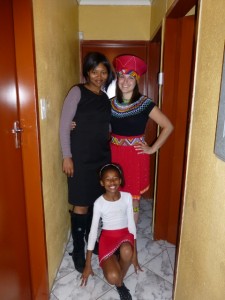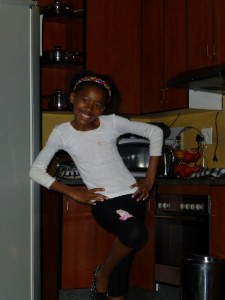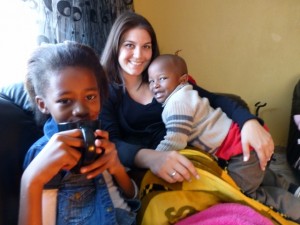Dumelang!
This is a Sotho greeting that I learned from my urban homestay in Johannesburg! I spent only three days with my host family, but it was a fantastic experience and nice to be in the comfort of a family even if they weren’t my own.
When we got to our home in Ormonde our host-mother, Nthabiseng, along with some neighbors were outside to greet us. It didn’t take long to get in the house, begin our first meal (lamb and rice Mmmm) and jump into conversation. Our mother was open and invited our questions immediately. She was also really interested in our stories and culture, asking questions about previous things she had heard and images from television. She works in school administration and her husband, Sifiso, at the Hilton in Sandton (a very wealthy area that we visited later that weekend). They live in a small, one floor, gated house like all of the other people in that neighborhood. The house reminded me a little of my home and their family has two Volkswagens just like mine—a “South African Polo Blue” as their little three year old boy (Sandile) likes to call it.
The father had to leave the first evening to help with the funeral of his cousin, which we learned are slightly different from funerals in the United States, much larger. People from all over come in support of the family, even if they are only acquaintances and after large meals take place at a relative’s house, but are never catered. Neighbors and friends pitch in and cook enough for everyone to eat and this is a lot of food when you are feeding hundreds. They also have ceremonies called tombstones three or four years later and like the funerals they are much more uplifting than the funerals I know. It is a celebration of that person’s life. For the celebration people purchase new, very formal, clothing and even paint their houses sometimes as rejuvenation.
The funeral practice seemed to transcend tribes, but throughout the homestay I found that there were some things that didn’t and distinct differences between tribes. The relationship between our host mother and father was interesting because of their different backgrounds, the mother being Sotho and the father Zulu. The mother ultimately adopted most Zulu traditions including the clothing and wedding ceremony, but still speaks her mother language and has taught it to her children. The children are incredibly smart. They know three languages fluently: Sotho, Zulu, and English and study Afrikaans in school, but more impressively they toggle back and forth between these languages depending on the person they are talking to.
I found this is common among people here, the switching between languages (there are eleven official languages). It’s really amazing and they seem to do it with ease. We had a host-sister in the house and she taught us some basic terms and patiently went over the pronunciations and spellings with us repeatedly. Some of the languages have “clicks” or snaps with your tongue and I found it very difficult. It was easy to connect with her though—she was excited about having students from the United States in her home, was a fan of the same music that we like, and broke the ice by taking funny pictures with us on her phone.
 On our second day there we visited an old age home in Soweto that the mother goes to on weekends. We helped out with the dishes and got to join in on a Bible study with a couple of the women that lived there. They gave us their advice for life and were happy we were here to study. We also went to church on Sunday and this had to be one of the best experiences ever! It was so lively, even though my host-mother claimed it was boring compared to her usual service. (I can’t imagine how exciting her Catholic church must be.) The service was entirely in a tribal language so I couldn’t understand anything, but I felt connected with the people. They included us and encouraged us to get up and dance. While watching them, I felt like I was surrounded by a strong community, people who enjoyed being there on Sunday morning with others they loved. Each person would lead the congregation in a song (with loud and really beautiful voices) and then as everyone else chimed in they would stand and dance and smack the Bible for a beat. A smile was plastered on my face. We even danced our way to the alter to leave our donation—absolutely a euphoric moment.
On our second day there we visited an old age home in Soweto that the mother goes to on weekends. We helped out with the dishes and got to join in on a Bible study with a couple of the women that lived there. They gave us their advice for life and were happy we were here to study. We also went to church on Sunday and this had to be one of the best experiences ever! It was so lively, even though my host-mother claimed it was boring compared to her usual service. (I can’t imagine how exciting her Catholic church must be.) The service was entirely in a tribal language so I couldn’t understand anything, but I felt connected with the people. They included us and encouraged us to get up and dance. While watching them, I felt like I was surrounded by a strong community, people who enjoyed being there on Sunday morning with others they loved. Each person would lead the congregation in a song (with loud and really beautiful voices) and then as everyone else chimed in they would stand and dance and smack the Bible for a beat. A smile was plastered on my face. We even danced our way to the alter to leave our donation—absolutely a euphoric moment.
Besides these outings, we watched a lot of TV during the day and even through meals—soap operas or “sopes” are extremely popular here, both American and South African shows. They also watch some American football on the sports channels, South African Idol, and Madea’s Family, which I told my host-family that my brother and sister also love this movie. It is women’s month here right now so there were tributes to women on the radio and TV with traditional dances and singers too.
We broke this time up with conversations about the miners’ strike that happened in August and about the chief in Swaziland that has 20-30 wives, and I learned more from our host-mother about the characteristics of a “Soweto woman” which she was. She told us that Soweto girls are not passive and polite like rural women, but liked their short skirts, wild nights and had attitudes. Our mother liked to joke with us and tell us stories about her trips to Durban with friends where they would say, “the women have grown up to drink like their fathers and the men have grown up to cook like their mothers,” pointing out that their husbands were more home-bodies.
She also shared with us some family stories, like their visits to the zoo, things the kids like to do, and their belief in Santa Clause and the Easter Bunny, so I asked if she also had to play tooth fairy every so often. Yes, she still slipped money to her children for their tooth, but into their shoe instead of under their pillow. In households here you put your tooth in your shoe. During the night a little mouse comes and take your tooth, in its place he leaves money, and then he throws it on top of the roof. While on the roof your tooth grows until he brings it back to your mouth (as your adult tooth). I may consider telling children this version instead—I liked it.
We talked about going to Kliptown (the township where I felt like an intruder earlier that week) but I felt very comfortable now. The idea of going to grab some produce from a stand there or the sheep intestines she wanted to cook didn’t bother me at all, but I did ask her how people living in that community feel about tourist that come and stare at them. Her opinion was that they would be very excited to have us. She said many would even like to have white students stay in their house so that they feel special and respected within the community.
I am baffled by this phenomenon, this elevating of white people and people from the United States. I asked our guide, Nespect, about it and he explained a couple of different reasons, one being that white people are the ones with power and people here (and I’ve noticed other parts of the world) that in order to get closer to that power they must get closer to white people. He also encouraged me to continue asking people that I meet about things like this. Regardless if this confuses me, my experience in the neighborhoods that we have been in, is that people are unbelievably welcoming—they smile and hug you, say they are happy to see new faces, and ask you if you are eating well (they really like to feed their guests…really).
The first morning in our home we went and got Amugwinya “fat cakes” and they have been given this name for a reason. It is a fried dough served with thick slices of a meat (sort of like pepperoni) and dried fish that is heavily salted. The fish tasted like the smelts my family has at Christmas time. We were offered pies too, but these aren’t sweet pies, they are flaky crusts filled with meat inside. Then, for lunch we had a Kota. This sandwich puts Wendy’s baconator to despicable shame. It is a tower of four slices of bread, with layers of cheese, avocado, bacon, a burger in between and “chip dip” a creamy sauce like thousand island dressing. This also comes with a not-so-modest side of “chips” which are really thick french fries. After this, I had had enough food for the entire week, but we still hadn’t eaten dinner. For dinner that night we had lasagna, but it wasn’t my Grandma T’s. Though nothing can beat that, this came really close. It was layers of flat sheets of noodles (unlike the crimped ones we use) a spicy sausage, cream sauce, and then sweat and sour sauce on top. All three of the sauces were homemade and it was delicious. There were also dozens of homemade cookies for dessert, but it took me a couple days before I could even try one because the meals were so large.
So we sat around the television, wandered around some places in town, and ate… a lot. I got to go through their normal routines and it felt good to be around those familiar things in this unfamiliar place. Overall, the weekend was wonderful and I feel so lucky to have been a part of their family for a very short time.
Salang Hantle



Leave a Reply